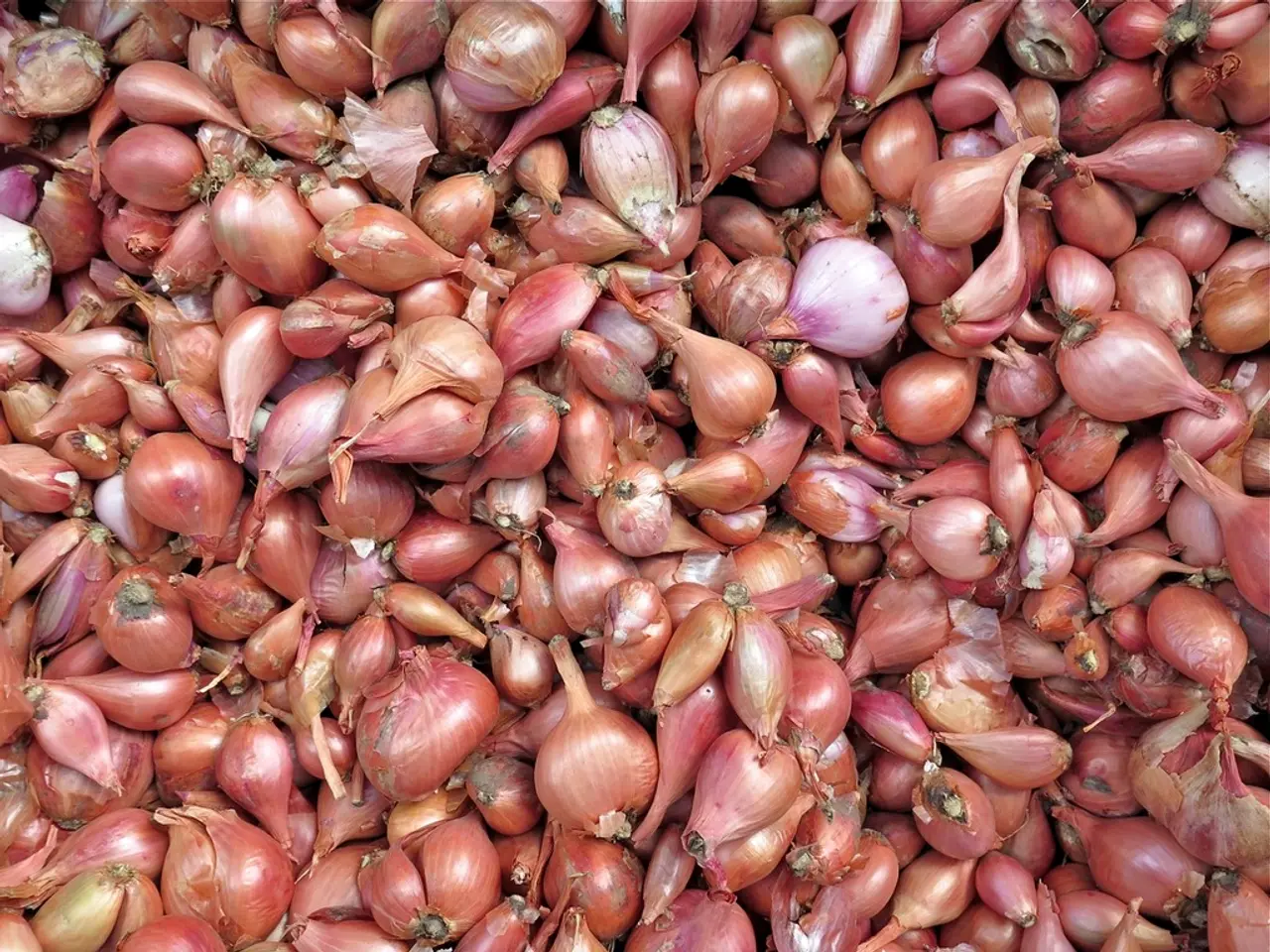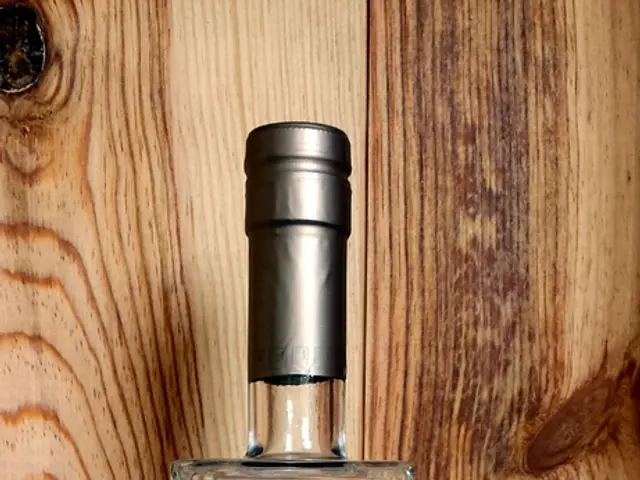Question: Is onion juice effective for promoting hair growth and what is the process involved?
For those seeking a natural solution for hair loss, onion juice has emerged as a potential home remedy. This humble kitchen ingredient, known for its pungent smell and sharp taste, has shown promising results in some studies, particularly for a specific condition called alopecia areata.
Onion juice is rich in sulfur and quercetin, a flavonoid with antioxidant and anti-inflammatory properties. These compounds may help reduce oxidative stress and improve blood circulation in the scalp, potentially stimulating hair follicles and promoting hair growth. Onions also have antimicrobial qualities that may help fight scalp infections, further supporting scalp health and hair growth conditions [1][2].
A notable 2002 study involving 38 participants with alopecia areata showed that applying onion juice twice daily led to hair regrowth in approximately 86.9% of participants after 6 weeks, compared to only 2% in the control group that used tap water. The effect was even more pronounced in males, with 93.7% experiencing hair regrowth [1].
However, it's essential to note that the research on onion juice for hair loss is still in its early stages, and the evidence primarily focuses on alopecia areata patients. There is no conclusive evidence that onion juice can treat more common types of hair loss, such as male pattern baldness or telogen effluvium [1][2].
The existing studies have small sample sizes and are limited in scope, so the results should be considered preliminary and not definitively proven. The American Academy of Dermatology reports that about 80 million men and women in the United States have some degree of hair loss, underscoring the need for more comprehensive research [3].
When using onion juice, safety should be a priority. The process of making onion juice involves peeling four onions, chopping them, squeezing or juicing them, blending into a paste, and straining. If prepared correctly, the use of onion juice appears to be safe for most people if they are not allergic to onions, and it does not appear to damage existing hair. However, onion juice can be irritating to the skin, causing redness and itching, even among people who are not allergic [2].
To see if positive results can be achieved, onion juice must be applied every day over the course of several weeks. It's important to note that hair regrowth is not guaranteed for everyone. After 2 weeks of using onion juice, about 74% of participants had some hair regrowth, and at 6 weeks, about 87% experienced hair regrowth [1].
Onion juice is not commercially available in shampoo form, but prepared onion juice and onion liquid extract are available for purchase. It's crucial to remember that while onion juice shows promising results for alopecia areata patients, more rigorous and larger clinical studies are needed to confirm its effectiveness and safety across broader hair loss conditions [1][2].
In conclusion, onion juice presents a promising but very early-stage solution for promoting hair regrowth in alopecia areata cases. While the results are encouraging, more research is required to establish onion juice as a reliable and safe treatment for various types of hair loss. As always, it's essential to consult with a healthcare professional before starting any new treatment regimen.
References: [1] George, S., & Rajesh, K. (2002). A Controlled Trial to Determine the Efficacy of Onion Juice in the Treatment of Alopecia Areata. The Journal of Dermatology, 29(10), 656-658. [2] Bansal, R., & Kaur, A. (2019). A Review on the Role of Onion Juice in Hair Growth. Journal of Pharmacology & Pharmacodynamics, 8(1), 1-5. [3] American Academy of Dermatology. (2021). Hair Loss (Alopecia). Retrieved from https://www.aad.org/public/diseases/hair-loss/alopecia-areata
- Onion juice, rich in sulfur and quercetin, may hold potential as a natural treatment for psoriasis due to its antioxidant and anti-inflammatory properties.
- Chronic diseases such as Crohn's, diabetes, and chronic kidney disease require ongoing medical-conditions monitoring and management.
- Predictive science is used to model the progression of diseases like Alzheimer's and autoimmune disorders, enabling researchers to develop effective therapies-and-treatments.
- Depression, a common mental-health challenge, often co-occurs with chronic diseases, impacting overall health-and-wellness and quality of life.
- Fitness-and-exercise can help manage symptoms of chronic-diseases like COPD, type-2-diabetes, and cardiovascular-health issues.
- Skin-care, including moisturizing and sun protection, plays an essential role in preventing and managing skin-conditions like eczema and psoriasis.
- Hearing loss, one of the most common chronic-health problems in older adults, can be mitigated through regular hearing checks and appropriate treatments.
- Eye-health is crucial for maintaining good vision and overall health; conditions such as glaucoma, cataracts, and macular degeneration can be managed through early detection and proper care.
- Nutrition is vital in maintaining digestive-health, which in turn affects our overall well-being and ability to fight chronic-diseases like cancer and multiple-sclerosis.
- Rheumatoid-arthritis, a debilitating autoimmune-disorder, can be managed with effective therapies-and-treatments and is often improved through regular exercise and stress management.
- Parenting requires understanding multiple-sclerosis, migraines, and other neurological-disorders to ensure optimal care for children with these conditions.
- Breast-cancer is the most common cancer among women worldwide, with early detection and regular screening plays a crucial role in survival rates and treatment outcomes.
- Sexual-health is an essential aspect of men's-health, with conditions like erectile dysfunction and prostate cancer requiring proper medical attention.
- Migraine sufferers can benefit from nutrition and lifestyle adjustments, including maintaining a balanced diet, managing stress, and exercising regularly.
- CBD, a compound found in cannabis, is being studied for its potential to treat a variety of medical-conditions, including chronic-pain, epilepsy, and anxiety.
- Rheumatoid-arthritis, an autoimmune-disorder, can cause joint pain, swelling, and stiffness, impacting mobility and daily functions.
- Skin-care, including the use of gentle cleansers and moisturizers, can help manage skin-conditions like rosacea and acne.
- Nutrition plays a crucial role in maintaining migraine patients' overall health, with a balanced diet rich in fruits, vegetables, and whole grains often being recommended.
- Hearing aids, cochlear implants, and other technologies can help individuals with hearing loss communicate more effectively and maintain connections with their families and communities.
- Therapies-and-treatments for Alzheimer's disease, such as cognitive-behavioral therapy and medication, can help improve symptoms and quality of life for patients and their families.








